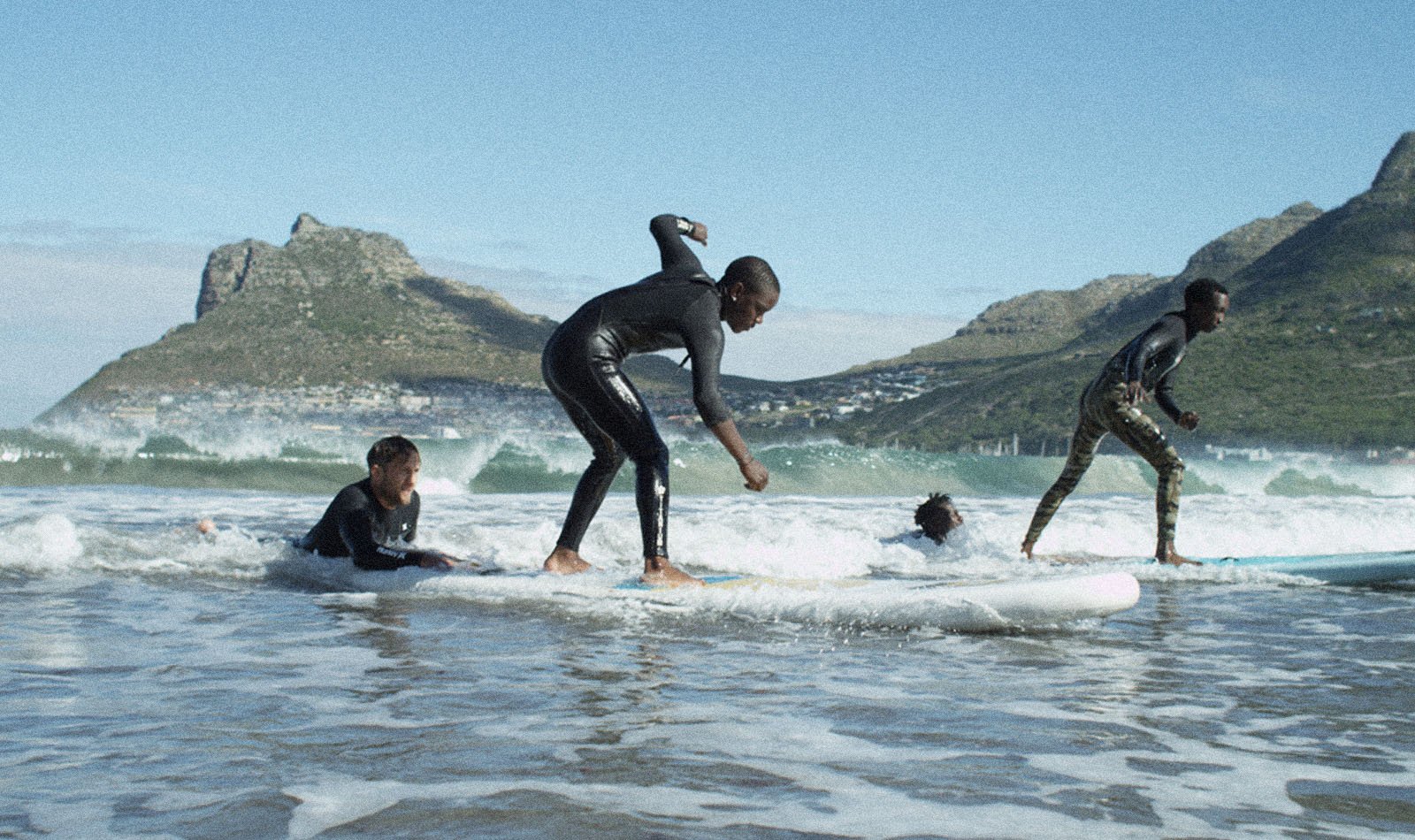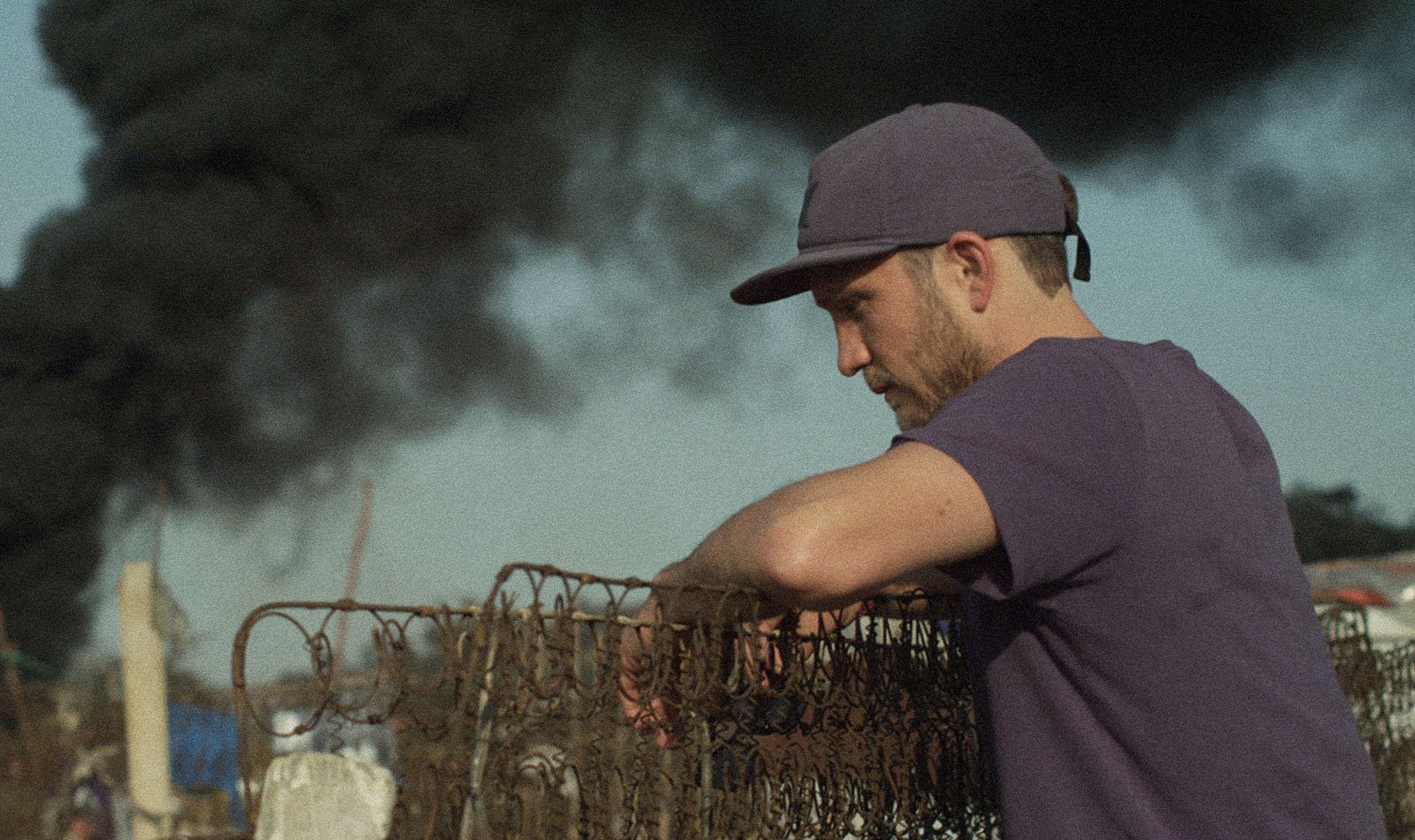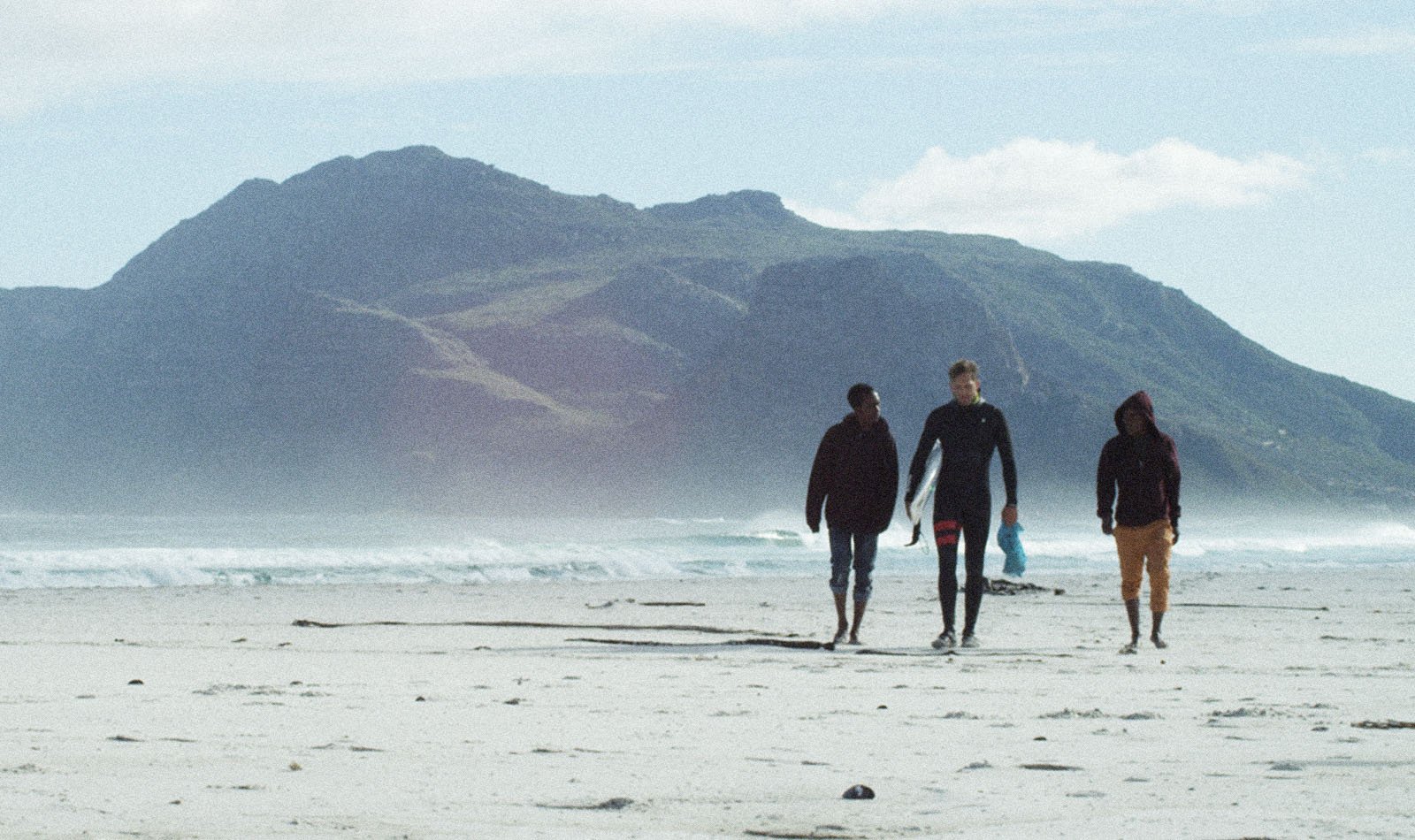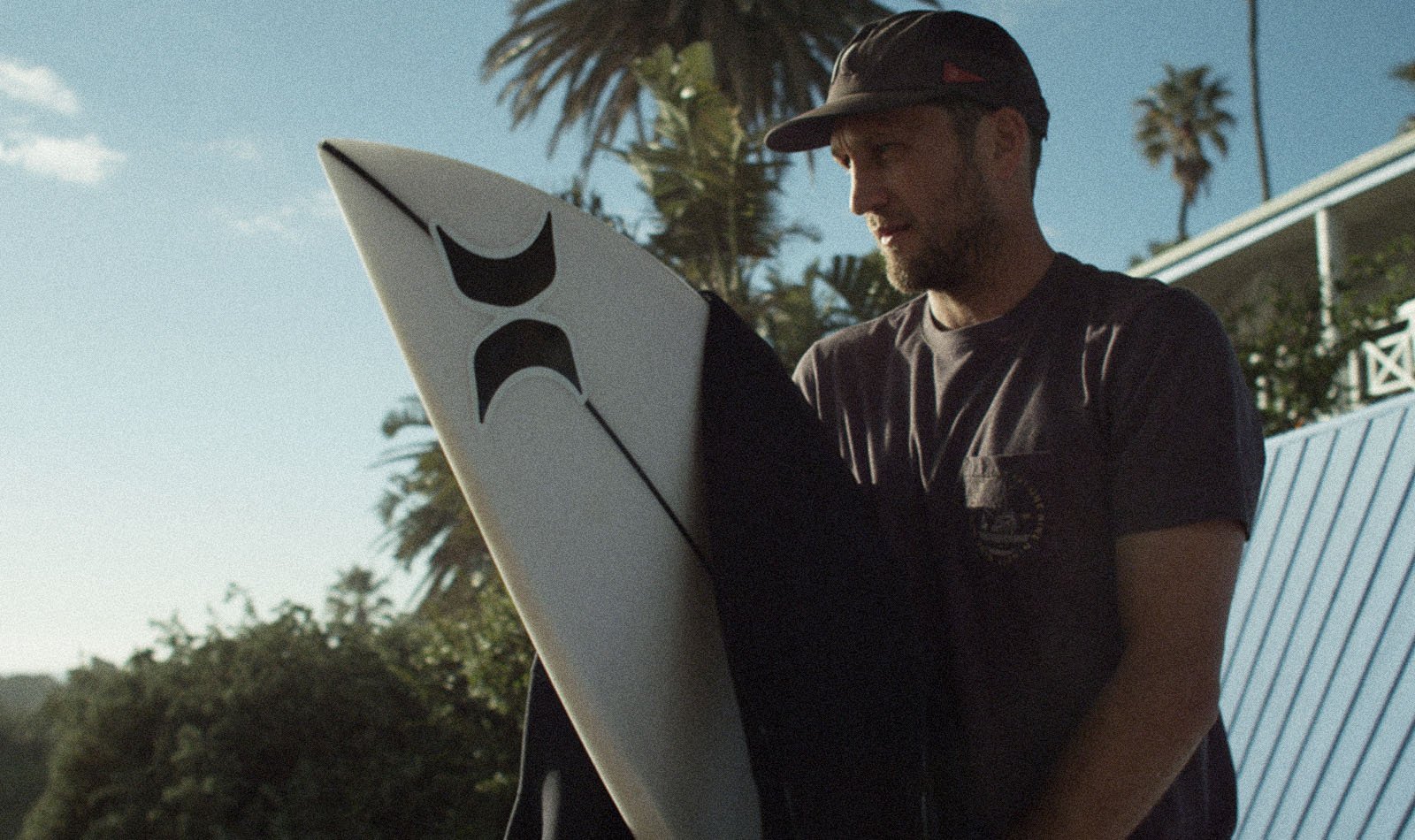People: Frank Solomon
A blur of big waves, fact and fiction, Let’s Be Frank, the Emmy-award winning documentary about Frank Solomon’s life, sees the South African surfer paddle across some of the sharkiest waters in the world to surf its most dangerous waves, box bare-knuckled in Ireland, live as a fugitive on an undisclosed Mexico beach, follow bedridden months following a broken back with adrenaline-fueled weeks charging down Oahu’s Pipeline. It is a valiant attempt at unraveling the enigma that is one of professional surfing’s living legends.
Here at Clean Waves, however, we know Frank Solomon as a Parley ambassador who has surfed for the oceans at 2019’s Corona Bali Protected and documented the lives of South Africa’s Street Surfers – the unsung heroes in the war against plastic pollution. A humble guy who considers becoming a professional surfer in the first place his biggest achievement – until he founded the Sentinel Ocean Alliance in 2017, that is. Based out of a series of shipping containers on Hout Bay on the fringes of Cape Town, Sentinel is a coalition of NGOs that creates ocean-based opportunities for the young people of South Africa’s coastal communities, and includes Parley’s Ocean School.
A committed oceans activist, Frank played a crucial role in raising awareness of Shell’s plans to prospect for oil and gas reserves in the Eastern Cape, and the funds needed to fight and succeed in preventing them from seismic blasting the floor of one of the world’s most biodiverse oceans. Now, he’s taking on a new challenge: the industrial-scale extraction of minerals like zircon, ilmenite, rutile, magnetite and garnet – which among many other uses are key ingredients in metal and paint manufacturing – along hundreds of miles of South Africa’s Atlantic coast, a biome of unparalleled natural beauty, through the fund-raising platform Protect the West Coast. We spoke to Frank about what motivated him to start Sentinel, the need to protect the world’s wildernesses, and taking some of the world’s most powerful multinationals to court.
“I was probably a way better lifeguard than a competitive surfer.”
HOW DID YOU GET INTO SURFING?
I grew up in Hout Bay, that’s where Sentinel is. I went to school there. My dad was an avid surfer lifeguard, so I always looked up to my dad and wanted to be like him, you know? I think that's what drew me to the ocean, and from five years-old I was doing lifesaving. I got into surfing quite late, and started to do some local competitions when I was at high school, but I never thought I’d make a career out of it – and to be honest, I was probably a way better lifeguard than a competitive surfer. I later went out to surf Mavericks in northern California to try to make it as a pro surfer, but I didn’t know anyone. I was just a kid, I didn't have any money or sponsors. So I would surf in mornings and work in the afternoon, selling Christmas trees and shucking oysters. I guess my biggest achievement was actually becoming a pro surfer in the first place.
WHAT MOTIVATED YOU TO START SENTINEL?
I was traveling in France, and I saw this horrific video of a kid being shot in the face when he walked down from Hout Bay to the beach. I saw that and I was like, everything I've been able to do has been because I was able to go to the beach; I had access to the ocean. But then this kid wasn't even able to walk down to the beach, and that put something inside me to try do something more than just chasing Instagram photos for surf sponsors. That life felt a bit empty. Seeing this video made me start Sentinel Ocean Alliance.
SURFERS ARE OFTEN THE FIRST RESPONDERS, OR AT LEAST THE FIRST TO RAISE THE ALARM TO THREATS AGAINST THE OCEAN – THE CONNECTION BETWEEN SURFERS AND OCEAN CONSERVATION GOES BACK A LONG TIME, TO SURFERS AGAINST SEWAGE, IF NOT BEFORE. BUT SOMETHING THAT REALLY STANDS OUT IS HOW CLOSELY YOU WORK WITH LOCAL COMMUNITIES, FROM INTEGRATING MINDFULNESS INTO YOUR PROGRAMS TO CREATING EMPLOYMENT OPPORTUNITIES FOR THE UNDERPRIVILEGED.
I think it comes from growing up in South Africa. The divide between rich and poor is so in your face – life is pretty real here. I started Sentinel in 2017. I didn't know anything about setting up a nonprofit. I still didn't really know anything, but I basically just drove up and down Hout Bay, looking for a space where I could set something up. And just next to the toilets on Hout Bay beach there was just this empty piece of land homeless people would sleep at. There was nothing happening there, and I was like, oh, this would be a cool spot to maybe set up a little surf school or something. And I just went there every day; I didn't know what I was gonna do. I would just pick up rubbish, and then I would plant some plants. I did that every day for a year, just trying to make the place look nice. And from there it slowly evolved: I approached Waves for Change, who do a surf therapy program, and they're like, cool, let's do it; you need to find two coaches from the community and we'll slowly start on a Saturday. That then became a program that was happening every other day, and now it's a six days a week program.
WHAT HAPPENS IN THE PROGRAM, CAN YOU BREAK IT DOWN?
It's a mental health surf therapy program, which incorporates mindfulness and surfing. The program teaches life skills through surfing and gives the kids access to positive adult role models through the surf coaches. They come down to the beach after school and they do breathing exercises and other fun activities. And then at the end they all go surfing. It's quite an in-depth program, but the kids absolutely love it. Waves for Change do amazing work.
HOW DID THE HOUT BAY SURF LIFESAVING CLUB COME ABOUT?
I started the Hout Bay Surf Lifesaving club because lifeguards on the beach earn quite a substantial income, around 10,000 Rand a month, which is quite good here. There are six or seven pro lifeguards in Hout Bay, but they were all from another part of the country, so I was like, let's have those guys from the community — let them have the income — rather than bringing people in. And yeah, I started the Hout Bay Surf Lifesaving club next to the Waves for Change. Initially it was all in one little green container and then Waves for Change got their own container. We do lifesaving training every Sunday, and we have 60 members now. It’s quite a big program. Then, at the beginning of 2021, I proposed to Parley that they could put a Parley Ocean School here, but Mike Long (Parley’s Operations Director) asked if we had the relevant permissions to do so. And I was like, not really – at the time I was kind of winging it with the government, because no one was getting back to me and like the politics in South Africa is so hectic.
WAIT, ARE YOU, ARE YOU SAYING THAT YOU JUST PUT A SHIPPING CONTAINER ON THE BEACH WITHOUT PERMITS OR ANYTHING LIKE THAT?
Yep. I was trying to do it with permits, but the process was basically impossible. There was this really cool city official who said, off the record, just do it and ask for permission afterwards, but don't say I said so. So yeah, I just kind of winged it, but in the end I got the official permits, and so we started to build the Parley AIR station. It’s a half a million-rand ($50,000) shipping container, where we’ve combined the Waves for Change program, the lifesaving club upstairs and the Parley Ocean School. We teach kids about the ocean, about the environment, and why we need protect it. And then we've also developed this learn to swim program called Turn the Tides, because a lot of the kids can't swim. Last year we developed a learn to swim program, as we found that if you're telling kids to avoid plastic, and not to do all this stuff, that if they can't swim they don't have a connection to the ocean, so they don't really care about it. I have like 12 employees now, and last year we reached over 2000 kids through our various programs. It’s quite surreal now to look back at how it all started from this little green container.
“What’s crazy to me is that our government is selling our coastline to these foreign companies. Who are they to say you can buy a beach and destroy it?”
AFTER YOUR CAMPAIGN TO SAVE SOUTH AFRICA’S EAST COAST FROM SHELL’S SEISMIC BLASTING, WHAT’S AT STAKE WITH MINING ALONG SOUTH AFRICA’S WEST COAST?
It's literally one of the most beautiful places in the world. It's such a unique environment. You have the West Coast national flowers, and when the flowers bloom up there the whole area goes pink and blue and green – it was in Blue Planet or one those David Attenborough films. It's like a marvel of the world. And it's very sparsely populated – it's basically just hundreds of kilometers of rugged coastline and animals. It's so unique in this day and age to have a place where if you and me drove up there right now, we could just go and camp on the beach – wild camping. You have to take your own water. There's no cell phone service. There's no infrastructure. It's beautiful because there's nothing there. I just think it's so important to protect these wild places – you can see what Africa was like hundreds of years ago. But part of the issue of it is the isolation: it seems like the South African government is unequivocally backing any company, mainly Australian and Chinese companies, that want to go there and mine because there’s no one there.
BECAUSE IT’S SO UNDER THE RADAR?
So under the radar. I was involved with the Shell thing here on the east coast, where they were trying to do the seismic blasting. But the east coast is very populated with local tribes, and everyone goes there, so people have a very deep connection with that coast.
THE EAST COAST HAS THOSE WARM INDIAN OCEAN CURRENTS…
The water's way warmer. But people don't have that same connection with the west, Atlantic coast, so the government thinks because people don’t go to the west coast it doesn’t matter what happens there. De Beers were mining diamonds there for 20 years, there’s these massive roads, and a huge infrastructure of schools, buildings, golf courses – but now it’s a ghost town. They took all the money and then bailed. When I went to visit recently there was a Chinese mining concession which had taken over a huge area of coastline and stopped us from accessing the beach when we tried to surf there.
SO, WHAT’S THE STORY – NOW THIS WHOLE AREA HAS BEEN TURNED OVER TO MINING COMPANIES THAT ARE GOING TO EXPAND THEIR OPERATIONS ALL ALONG THE COAST?
We’re talking about hundreds and hundreds of kilometers of the coastline earmarked for mining. They’re continuously staking out more areas to mine, prospecting out on these random empty beaches. If they find something, they send in applications to mine those areas. It's a constant battle of people putting in applications to mine, and us trying to find and oppose those applications – but there are literally hundreds of applications. And the government's taking any money that it can, you know?
THERE'S THIS GREAT QUOTE IN THE FILM OURS, NOT MINE, RELEASED TO RAISE AWARENESS OF THE ISSUE: ‘HUMANS ARE THE ONLY ANIMAL THAT DESTROYS ITS OWN HABITAT.’ AND WHAT A BEAUTIFUL HABITAT, ABOVE AND BELOW THE SHORELINE: THE COLD WATERS SUSTAIN THESE IMMENSE KELP FORESTS WHICH WORK MIRACLES IN SEQUESTERING CARBON AND CREATING NUTRIENTS FOR ALL KINDS OF MARINE LIFE, WHICH IN TURN SUSTAINS THE LOCAL KHOI SAN PEOPLE THROUGH FISHING; AND INLAND, THERE ARE HUGE FARMS RELYING ON AQUIFERS WHICH WILL BECOME CONTAMINATED THROUGH MINING. MINING THREATENS THE LIVELIHOOD AND FOOD SUPPLY OF ANYTHING AND ANYONE THAT LIVES ALONG THAT COAST, AND BEYOND.
What’s crazy to me is that our government is selling our coastline to these foreign companies. Who are they to say you can buy a beach and destroy it? The Khoi San have been living in that area from before time began; in Lambert’s Bay, where there’s a lot of prospecting, there are hundreds of Bushman paintings dating back to tens of thousands of years ago. But now they’re such a minority; they’re poor fishermen who live off the land, and they don’t have the means to fight against a giant Australian mining company. And our government is so corrupt and wants the money so badly, that if someone comes in with 10 billion, they’re gonna be like, ‘here’s the land’.
HOW DO YOU GO ABOUT RAISING AWARENESS OF AN ISSUE THAT’S TAKING PLACE FAR OUT OF SIGHT?
We try to show what it would be like to not be able to go to the beach, so we went to all the major beaches in Cape Town and taped up barriers and No Entry signs. And I think it made people realize what was going on up there – you wanna go to your local beach, but you can't because they're destroying it. We've had amazing success. The petition's been really successful, and the Instagram account has done a great job rallying all these really passionate people. But in the end, we’re just a bunch of surfers up against these huge companies, and it can be overwhelming at times.
WHAT’S THE AIM WITH GETTING 75,000 SIGNATURES TO THE PETITION – WILL IT THEN BE DEBATED IN PARLIAMENT?
Yeah. But like I said, there's so much money involved that the politicians can just ignore any petition that comes their way, because, you know, it's South Africa. So, I think the best we can do is to put together a legal attack to stop these guys from breaking the laws – these mining companies haven’t done any environmental impact reports, and no-one’s checking anyways. The government don’t care. So Protect the West Coast is rallying money towards a legal fund so we can get the best lawyers to fight these big companies. And then, to also try and change legislation so that they can't just pay someone in the government to turn a blind eye or give them access. Shell is a good example: they applied to do seismic blasting on the Wild Coast a few years ago, and got permission under old environmental legislation, but then only started the blasting at the end of last year. We only found out about it when the ship was in the harbor and through a lot of public pressure and public support, we were able to stop them from doing it, because a lot of the communities got involved. So yeah, with legal pressure, and public pressure, people from the communities, hopefully we can make a difference.
Follow: @franksolomon / @sentineloceanalliance
Photography credits:
Corona x Parley: Street Surfers film — by Eyeforce
Corona x Parley: South Africa Coastal Cleanup Tour film — by Eyeforce
Parley: The Air We Breathe film — by Eyeforce










